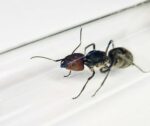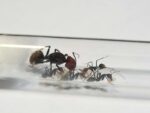Hot




Hurry and get discounts up to 40% Read more
Camponotus singularis is a monogynous ant species with a colony size of up to 1000-2000. Their development rate is slow. Queens measure 22-24 mm, workers are 9-13 mm, and majors range from 14-22 mm. They have a black color with reddish brown heads and noticeable hair. They primarily feed on food insects like cockroaches and crickets, as well as syrup and fruit.
zł 304.90 – zł 699.95
We give a 100% guarantee for the delivery of a live queen and colony to the client. You can read more about guarantees on the Guarantees page.
The most important thing is that you read the temperature conditions, moisture and what to feed the ants. It is important not to introduce too small a colony into a large formicarium, much less just one queen. It’s good if the formicarium is divided by partitions and if the first chamber is very small (such as in our Comfort formicarium). We recommend reading more information about keeping ants in our blogs!
 Difficulty in breeding
Difficulty in breeding | |
|---|---|
 Behavior
Behavior | |
 Wintering
Wintering | |
 The size of ants
The size of ants | |
 Origin
Origin |
Welcome to our Camponotus singularis ant colony! These fascinating creatures are known for their unique characteristics and behaviors. With this colony, you’ll have the opportunity to observe their monogynous nature, slow development rate, and impressive size.
The Camponotus singularis colony consists of different castes, each with its own size and color.
The ants are predominantly black, with reddish-brown heads. Notably, they have noticeable hair, adding to their unique appearance.
Feeding these ants a balanced and varied diet is essential for their well-being. Here are some recommended food options:
Providing a mix of protein, sugars, and other nutrients will ensure optimal health for the colony.
The Camponotus singularis ants have specific humidity and temperature requirements for their arena and nest:
Creating the perfect environment with the right humidity and temperature will contribute to the overall well-being and productivity of the colony.
The Camponotus singularis species is unique and has distinct characteristics that make them even more fascinating:
Observing these behaviors and characteristics will provide a deeper understanding of the ants’ natural instincts and habits.
For successful breeding, we recommend using either plaster or aerated concrete nests. These materials provide suitable conditions for the colony to thrive and reproduce.
By selecting the right nest material, you can ensure the ants have a comfortable and conducive environment to establish their colony and expand in numbers.
Thank you for choosing our Camponotus singularis ant colony. We hope you enjoy observing and learning from these incredible creatures!
Only logged in customers who have purchased this product may leave a review.
No account yet?
Create an Account
Ana Tunkevič (verified owner) –
Отличный большой и брутальный вид всем советую
Ana Tunkevič (verified owner) –
Очень быстрая доставка рекомендую хорошие поставщики и все очень окуратно упаковано 10 из 10